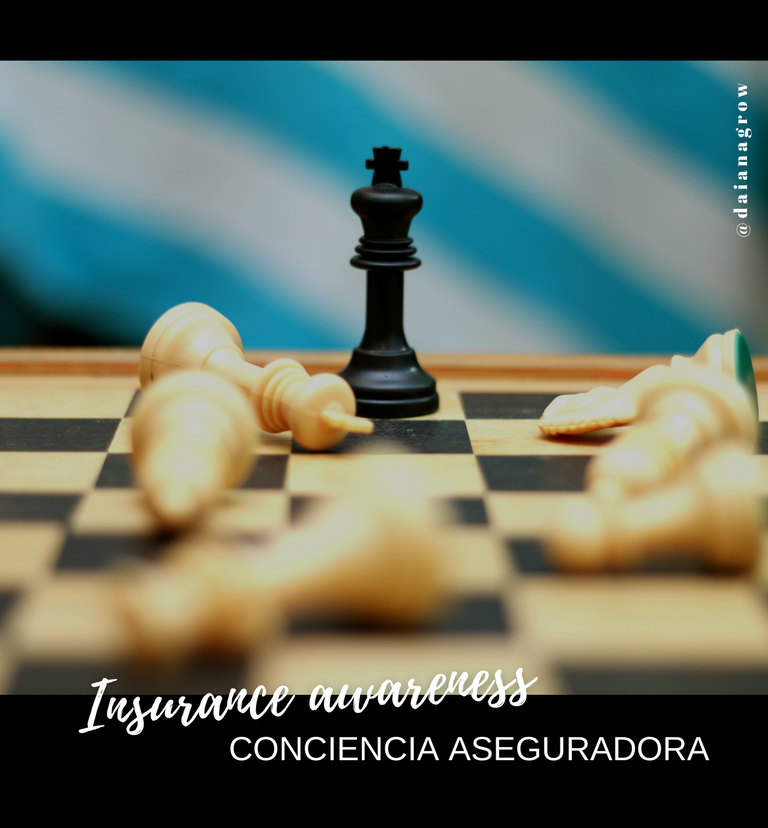
An upset stomach brought to my memory an anecdote to forget. A true story that taught me a lesson forever, and as they say here "in a blacksmith's house, a wooden knife".
Un malestar estomacal me trajo a la memoria una anécdota para el olvido. Una historia real que me dejó una enseñanza para siempre, y como dicen acá “en casa de herrero, cuchillo de palo”.
I have been an insurance consultant for over 12 years, I am supposed to be insured up to the laces of my sneakers, however I am not. In 2018 we took a friends trip to Salvador de Bahia, my boyfriend, my best friend and her boyfriend. To make a long story a little shorter, it turns out that my friend's boyfriend (from now on Mr. S), got food poisoning on the last day of our vacation together. Yes, we love it! It's sarcasm.
What does this have to do with insurance? As in every girlfriend trip, we even planned the clothes we would wear, but we forgot to take out travel insurance. I won't deny that until that day I underestimated the risk of getting sick outside my country, even ignoring that in other countries health care is not totally free and public as it is here.
So we had to rush to a hospital with Mr. S. We ended up in a SEMIpublic UPA (Rapid Care Unit), and I say so because if it had not been for a good cab driver we had met the day before who helped us, we would still be waiting to be attended (for being a foreigner).
It really was chaos, I was the only one of the 4 of us who knew Portuguese, so I bizarrely became his pseudo girlfriend for a few hours. He was fainting on top of me, my friend crying with my boyfriend, the local Bahians praying for him in prayer. We sincerely expected the worst, until they deigned to attend to him when we started screaming and rushed him into the doctor's office.
Luckily they gave him an injection and even with a slight fever Mr. S and my friend were able to make their flight, and we were able to continue our trip.
By dint of a negative experience I learned that the next time I travel out of the country, I should take out travel insurance being aware that I probably won't need it, but that the risk is always present.
Soy asesora de seguros hace más de 12 años, se supone que debería tener asegurado hasta los cordones de mis zapatillas, sin embargo no es así. En el año 2018 hicimos un viaje de amigos a Salvador de Bahia, mi novio, mi mejor amiga y su novio. Para hacer la historia larga un poco más corta, resulta que el novio de mi amiga (desde ahora Señor S), se intoxicó el último día de nuestras vacaciones juntos. Sí! Un copado!
¿Qué tiene que ver esto con los seguros? Como en todo viaje de amigas, planificamos hasta la ropa que llevaríamos, sin embargo nos olvidamos de contratar un seguro de viaje. No voy a negar que hasta ese día subestimé el riesgo de enfermarme fuera de mi país, incluso ignorando que en otros países la salud no es totalmente gratuita y pública como aquí.
Así que tuvimos que salir corriendo a un hospital con señor S. Terminamos en un UPA (Unidad de pronta atención) SEMIpúblico, y lo digo así porque si no hubiese sido por un buen taxista que habíamos conocido el día anterior quién nos ayudó, todavía estaríamos esperando que lo atendieran (por ser extranjero).
Realmente fue un caos, yo era la única de los 4 que sabía el idioma portugués, así que me convertí bizarramente en su pseudo novia por unas horas. Él se desmayaba arriba mío, mi amiga llorando con mi novio, los bahianos del lugar pidiendo por él en oración. Esperábamos lo peor sinceramente, hasta que se dignaron a atenderlo cuando comenzamos a los gritos y lo metimos dentro del consultorio a prepo.
Por suerte le dieron un inyectable y aún con un poco de fiebre señor S y mi amiga pudieron llegar a su vuelo, y nosotros continuar nuestro viaje.
A fuerza de una experiencia negativa aprendí que la próxima vez que viaje fuera del país, debo contratar un seguro de viaje siendo conciente que probablemente no lo necesite, pero que el riesgo siempre está presente.
And this experience is transferred to all risks for which there is insurance backing today. To give my opinion I will focus on my society, probably not everywhere in the world.
Y esta experiencia se traslada a todos los riesgos para los que hoy existe un seguro que lo respalde. Para dar mi opinión me enfocaré en mi sociedad, probablemente no sea así en todo el mundo.

Photo by Gladson Xavier at Pexels/Foto de Gladson Xavier en Pexels. Edited in Canva.com
To be aware is to think of the worst consequences / Ser conciente es pensar las peores consecuencias
I think this is the best way to look at it, I have never been a catastrophic person who goes through life thinking that the worst could happen, however, for this I consider that it does apply.
It is a topic that gives to write a book, since we are also talking about an educational root, which perhaps should start at home and continue at school. However, I am only going to talk about the importance that we give or not to take out insurance.
I will take as an example automobile insurance, which is the one I specialize in the most. The Argentinean, in general, insures his car half out of obligation and half to protect his patrimony. Is that correct? Yes, of course, but if you read it from the perspective I mentioned at the beginning, having your car stolen is not the worst thing that can happen to you.
It is true that our insecurity rate is high, it is also true that we must take out an automobile liability insurance by law in order to drive. But I wonder: If it were not mandatory and utopically there were no insecurity, would we continue to take it out?
Creo que es la mejor manera de verlo, nunca fui una persona catastrófica que va por la vida pensando que puede pasar lo peor, sin embargo para esto considero que sí aplica.
Es un tema que da para escribir un libro, ya que también estamos hablando de una raíz educativa, la cual quizás deba comenzar en casa y continuar en la escuela. Sin embargo solo voy a hablar de la importancia que le damos o no, a contratar un seguro.
Tomaré de ejemplo el seguro de automotor, que es en el que más me especializo. El argentino, en general, asegura su auto mitad por obligación y mitad por proteger su patrimonio. ¿Es correcto? Sí claro, sin embargo si lo lees desde la perspectiva que planteo al comienzo, que te roben el auto no es lo peor que te puede pasar.
Es verdad que nuestra tasa de inseguridad es alta, también es verdad que debemos contratar un seguro de responsabilidad civil de automotor por ley para circular. Pero me pregunto: ¿Si no fuese obligatorio y utópicamente no hubiere inseguridad, seguiríamos contratándolo?
Insurance awareness / Conciencia aseguradora
It is not about telling my friends and clients to insure their cars because if they don't they could ruin their lives or the lives of others, of course not, but it is an internal process of awareness of all the probable risks involved in driving on the streets, from damaging a house to injuring other people.
And in this topic I cannot leave out PREVENTION, of vital importance for this ecosystem. Taking out a policy does not release you from the responsibility of complying with the rules of the road, charges and social ethics. The latter is a good topic for another entry in my blog, I will write it down.
No se trata de decirle a mis amigos y clientes que aseguren su auto porque si no lo hacen podrían arruinar su vida o la de los demás, claro que no, sin embargo se trata de un proceso interno de concientización de todos los probables riesgos que conlleva circular por las calles, desde dañar una casa hasta lesionar a otras personas.
Y en este tema no puedo dejar afuera la PREVENCIÓN, de vital importancia para este ecosistema. Es que contratar una póliza no te desliga de la responsabilidad de cumplir las normas de circulación, cargas y ética social. Esto último es un buen tema para otra entrada en mi blog, lo anotaré.

Photo by Andrea Piacquadio at Pexels / Foto de Andrea Piacquadio en Pexels
What is the most important insurance a person should take out? / ¿Cuál es el seguro más importante que una persona debe contratar?
In one of the annual courses of my profession we were asked this question, and the answer was a true reflection of how we think. Almost no one answered what life insurance is, most focused on property insurance, and I include myself.
Being aware of the need to have life insurance, for example, would be a big step for our society. If we think that by leaving this plan we may be leaving our family in financial distress, our perspective would change, we would not see it as an unnecessary expense but would consider it relevant to protect our family in case of an emergency.
En uno de los cursos anuales de mi profesión nos hicieron esta pregunta, y la respuesta fue el fiel reflejo de cómo pensamos. Casi nadie respondió que es el seguro de vida, la mayoría se enfocó en un seguro patrimonial, y me incluyo.
Ser concientes de la necesidad de tener un seguro de vida, por ejemplo, sería un gran paso para nuestra sociedad. Si pensamos que al dejar este plano quizás estemos dejando a nuestra familia al desamparo económico, nuestra perspectiva cambiaría, no lo veríamos como un gasto innecesario sino que lo consideraríamos relevante para resguardar a nuestra familia ante una incontingencia.
Like everything else, these concepts do not develop in a parallel world; there are always economic, political and social aspects that affect their functioning. If I told you... my clients sometimes ask themselves: Do I buy my daughter's diapers or do I pay for the car insurance? Again, the bidding between the basics and the "supposed luxury".
Como todo, estos conceptos no se desarrollan en un mundo paralelo; siempre hay aspectos económicos, políticos y sociales que afectan su funcionamiento. Si te contara… mis clientes a veces se preguntan ¿Compro los pañales de mi hija o pago el seguro del auto? Otra vez la puja entre lo básico y el “supuesto lujo”.
There is hope, there always is, the statistics say that there is more and more awareness. That's where we are going, and that's where I collaborate. I try to educate, in the good sense of the word, my clients. That is what I can do for them from my position, among other issues that I will surely tell you about later.
I welcome your comments on this topic! I hope it has been of interest to you and thank you for reading me.
Hay esperanza, siempre la hay, las estadísticas dicen que cada vez hay más conciencia. A eso vamos, y a eso colaboro. Intento educar, en el buen sentido de la palabra, a mis clientes. Es lo que puedo hacer por ellos desde mi lugar, entre otras cuestiones que seguramente más adelante les contaré.
Son bienvenidos tus comentarios en torno a este tema! Espero haya sido de tu interés y gracias por leerme.
✨Nos vemos en la próxima y que terminen o empiecen un bonito día✨
📝Daiana.
Traducido en Deelp / Translated in Deelp
Collages hechos en Canva / Collages made in Canva